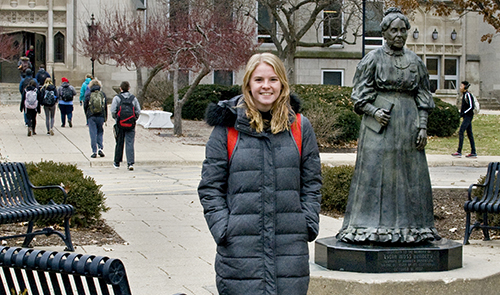
PHOTO BY CLARE HOWARD
Samantha Lechowicz stands near the statue of Lydia Moss Bradley, founder of Bradley University. Lechowicz researched Peoria Journal Star coverage of the original failure of Illinois to ratify the ERA; she found no overt bias in reporting but said coverage was undermined by stereotypes that influenced story placement, headlines and photo selection.
Bradley University senior Samantha Lechowicz researched the correlation between news coverage in the Peoria Journal Star and the repeated decades-long failure of the Illinois Legislature to pass the Equal Rights Amendment up until its recent passage in May 2018.
Some of what she found in a search of the newspaper archives from 1972 to 1980:
- Misleading headlines such as “Rights Women Demand Could Lead to Draft.”
- Demeaning headlines such as one referring to a Macomb advocate for the ERA as a “housewife.” Accompanying the article was a photo of the
woman with her children and a separate, very large photo of her husband with a sidebar about him. - Placement of news articles about the ERA on pages with ads for women’s underwear and women’s shoes.
- The gender of reporters covering the issue was 94% male and 6% female, however, the local Peoria male reporters were often found to report fairly and without bias.
“A lot of the coverage was accurate, but the stereotypes were concerning,” Lechowicz said, for example when Betty Friedan came for an event supporting the amendment, the article included information about her brother who owned a furniture store. Lechowicz said this fit a pattern of implying women were not able to stand on their own, were dependent on men and were defined by men.
“Peoria Journal Star coverage was not by any means based on bad intentions, but from a historical perspective, you see lapses,” she said.
The Journal Star’s style, following Associated Press style of the time, was to refer to women by their husbands’ first and last name. Lechowicz said again this implies women’s identities are dependent on men.
She specifically cited a page 1 AP article about Sen. Sam Ervin’s opposition to the ERA and his contention that passage would create a society where women could not be protected from rape.
An editorial by Patrick Buchanan implied passage would mean women would take jobs away from men.
Lechowicz, 22, said the coverage shows diversity is needed at all levels of an organization. She noted that when Illinois finally passed the ERA in May 2018, the newspaper’s language was more inclusive and quotes were more diverse.
“The research has made me really sad. It has been this long and the word “woman” is still not in the Constitution. This is not OK anymore,” she said. “It is painful that the original idea (for the ERA) was so long ago, 1923.”
She also points to the contradiction that in 1970, Illinois adopted a state constitution that includes equal rights language but failed to apply that to passage of a federal amendment to the U.S. Constitution.
In October, Lechowicz presented her research at the Lincoln Presidential Library annual history conference were she was the sole female on a panel with other male historians.
That type of panel is colloquially referred to as a “manel” by other female scholars.
Tim Conley, associate professor at Bradley University and one of Lechowicz’ advisors on her research paper, said she is an excellent archivist and her paper shows she is able to distinguish between individual expression and cultural forces at work in a society. She not only looked at the reporting but at headlines and the juxtaposition of articles with ads. She looked beyond the facts to the contextualization of those facts.
“Her work and talent are exceptional,” he said. “Her focus is on important cultural causes.”
Lechowicz recently catalogued some historical materials at the Peoria Women’s Club. Her favorite discovery was in an old macaroni and cheese box secured with rubber bands. The box held an original note written by Lydia Moss Bradley in 1893 pledging to give $5,000 for the purchase of land for the women’s club.
Journalism has become more diverse over recent decades, Lechowicz said, but she remains concerned from the perspective of historical accuracy that the Fox news channel remains “blatantly biased.”

Recent Comments